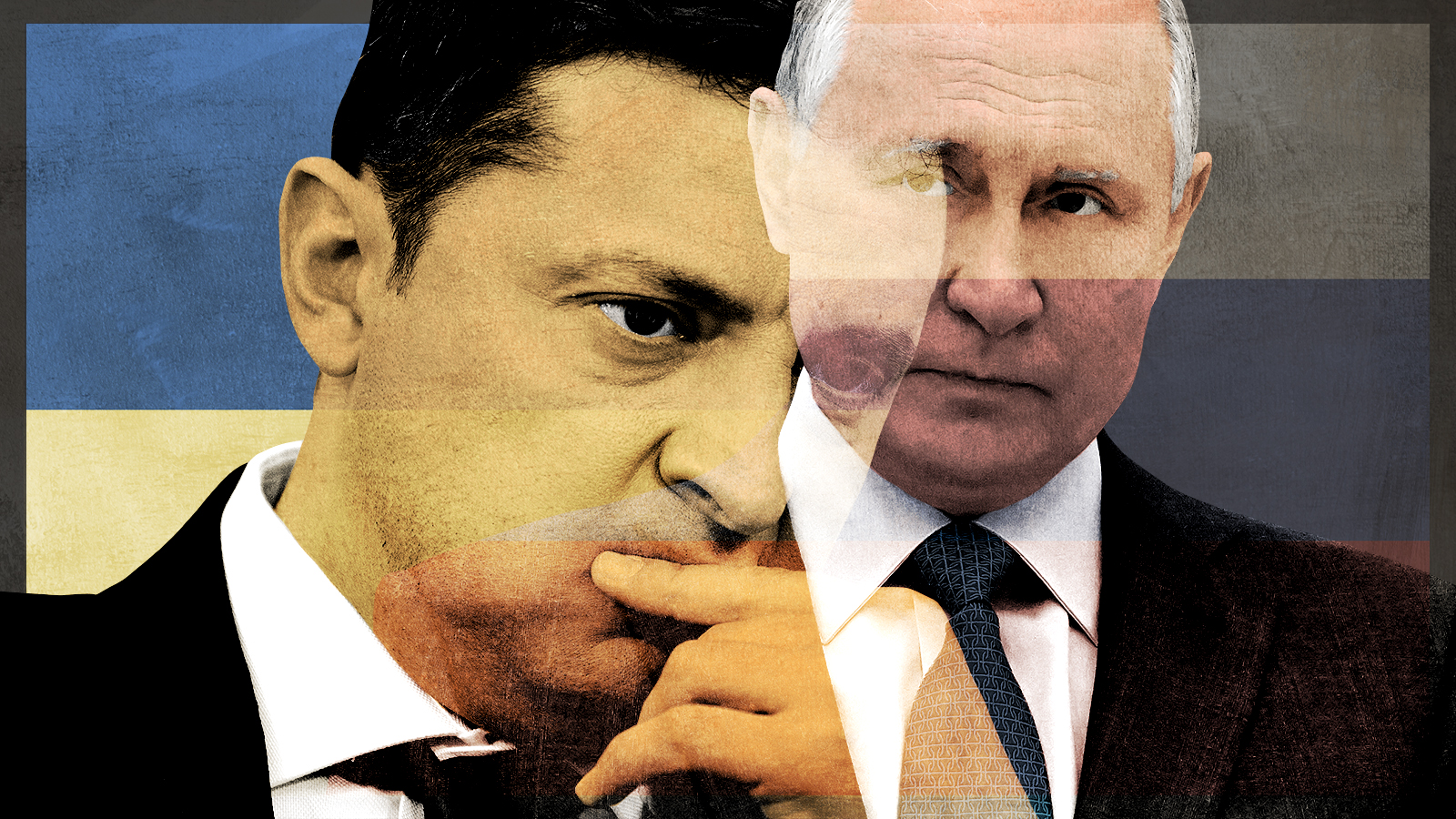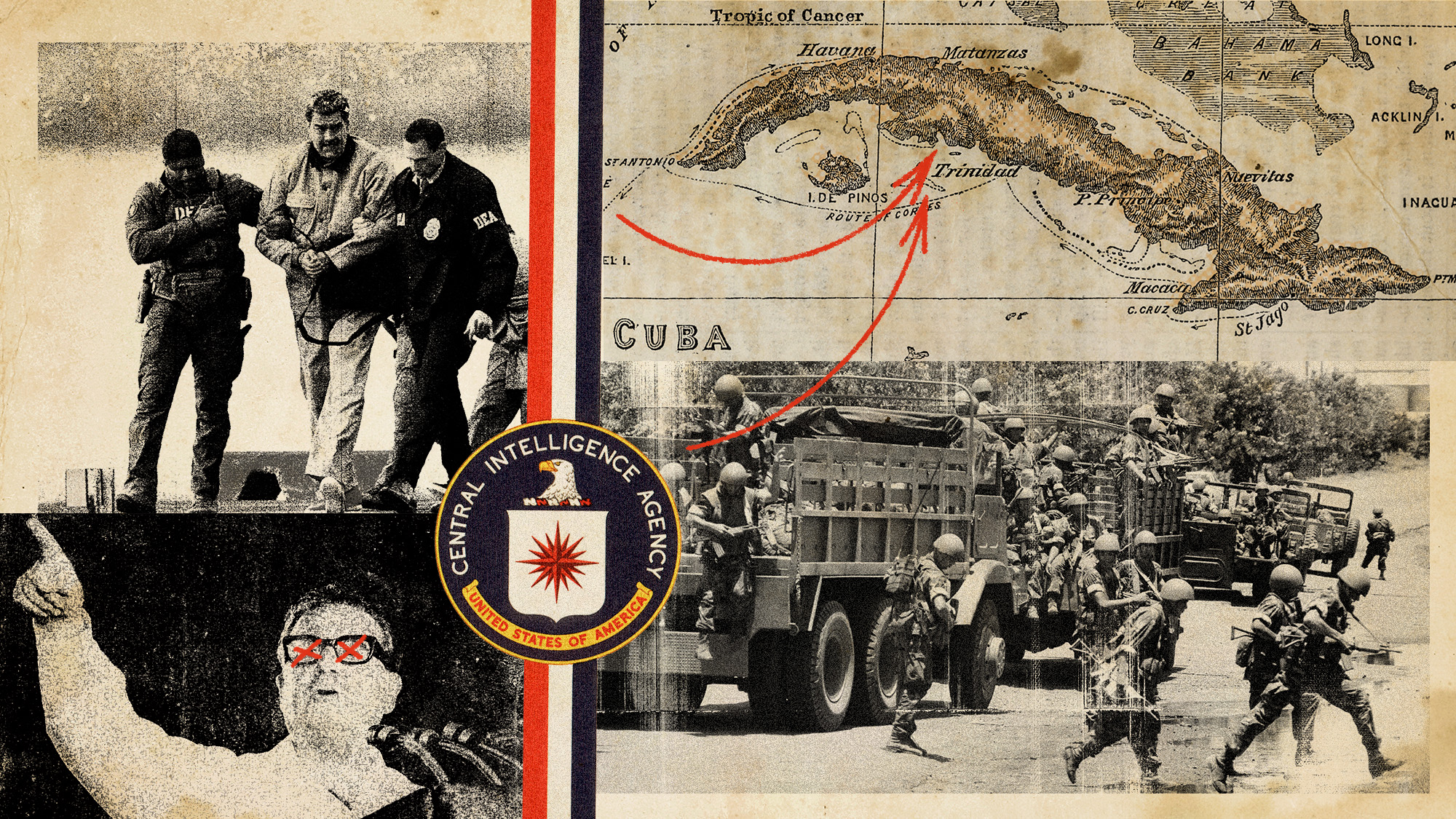What are the people of Ukraine really fighting for?
The war in Ukraine shows the limits of nationalism


A free daily email with the biggest news stories of the day – and the best features from TheWeek.com
You are now subscribed
Your newsletter sign-up was successful
Who's winning in Ukraine? I'm not asking about soldiers on the front lines or the civilians caught between them. Although we're flooded with reports, assertions, and assessments, it's desperately hard to assess the real state of the battle or to predict its outcome. Before the invasion began, U.S. officials expected Kyiv to fall within days — a goal that Russian forces still have not achieved a month later.
Instead, I mean the battle among us keyboard warriors to determine what it all means. In the absence of reliable information, it's tempting to appeal to broad frameworks and sweeping rhetoric. Many of us work on deadline, after all. And even those who don't need to say something in order to keep a hand in the game.
There's nothing wrong with trying to place current events in a broader theoretical or historical context. I've done it myself and intend to continue. The risk, though, is that our terms of analysis get "reified." That's a fancy way of saying that we treat abstract concepts as if they were real things, distracting us from a real world that defies neat explanation.
The Week
Escape your echo chamber. Get the facts behind the news, plus analysis from multiple perspectives.

Sign up for The Week's Free Newsletters
From our morning news briefing to a weekly Good News Newsletter, get the best of The Week delivered directly to your inbox.
From our morning news briefing to a weekly Good News Newsletter, get the best of The Week delivered directly to your inbox.
I think that that tendency to reification helps explain the debate about the role of nationalism in the Ukraine war. For some commentators, the war reveals both the necessity and resilience of liberal ideals that have been tarnished by association with economic instability, military adventurism, and cultural homogenization. Earlier this month, Francis Fukuyama — best known as the author of The End of History and the Last Man — argued that the war could be a renaissance for the "the liberal order…institutionalised in the form of the European Union, and the broader global order of open trade and investment created by U.S. power." With the real-world alternative represented by Putin's Russia, David French echoed, personal liberty, economic freedom, and international cooperation seem much more appealing than "nationalist, authoritarian" movements at home and abroad.
But that's all wrong, insist defenders of nationalism. Rather than refuting the view that political communities should be oriented around shared cultures within fixed borders, the heroic defense of Ukraine proved its relevance. Instead of parroting globalist cliches, argued Rich Lowry (who published The Case for Nationalism a few years ago), Zelensky roused Ukraine and the world by "speaking a nationalist's language of love for his people's history, land, and traditions."
The controversy will almost certainly outlast the actual war — which doesn't seem headed for speedy resolution. In addition to the professional incentives for ceaseless argument, that reflects the difficulty of fitting reality into prefabricated intellectual paradigms.
Start with nationalism. It's almost certainly true that more Ukrainains are moved by a sense of cultural solidarity, shared interest, and outraged pride than by principled commitment to the liberal international order. Although they've been stoked by Russian encroachments since the 2014 annexation of Crimea, these sentiments are not new. Like many European nationalist movements, they were first organized to resist imperial rule in early 19th century (at that time, what is now Ukraine was split between Austrian and Russian control). And many elements and symbols of Ukranian national identity, including the Ukrainian language, are older than that.
A free daily email with the biggest news stories of the day – and the best features from TheWeek.com
While Zelensky has appealed to human rights and other universalist themes in his addresses to Western legislatures, moreover, it's important to remember that he leads an electoral and political coalition at home. That coalition includes factions that are much more distant from liberal aspirations than he is. The role of far right elements, including the Azov Battalion, has been exaggerated by Russian authorities to justify their invasion as an "anti-Nazi" policy. But it's not completely imaginary.
As Fukuyama acknowledged in an interview published on Thursday, there are reasonable grounds to characterize Ukrainian self-defense as an example of successful nationalism. But they have to be balanced against the purposes that seem to drive Zelensky and, to the extent we can tell, enjoy majority support. NATO expansion was not the sole cause of the war, but Ukrainian aspirations to join the military alliance did arouse long-standing Russian fears of encirclement. And while Zelensky has effectively dropped that goal, in a concession to Russian interests, he continues to pursue membership in the European Union. Those are among the institutions Western nationalists have criticized as threats to political sovereignty and cultural independence.
A similar ambiguity applies to Russia. On the one hand, Americans tend to forget that Russia, too, is a multi-ethnic state. In addition to a remarkable array of linguistic and cultural groups, many attached to particular regions, its population includes a significant number of Muslims as well as Christians (and a diminishing number of Jews). Russian President Vladimir Putin invoked that diversity last month when he proclaimed "I am a Russian man…but when I see examples of such heroism as the feat of a young man — Nurmagomed Gadzhimagomedov, a native of Dagestan, a Lak by nationality, our other soldiers, I want to say: I am a Lak, I am a Dagestani, I am a Chechen, Ingush, Russian, Tatar, Jew, Mordvin, Ossetian." He might also have mentioned (but didn't) that iconic "Russian" leaders of the past, including Ivan the Terrible, Catherine the Great, and Joseph Stalin, were not exactly Russian in origin.
But it won't do to dismiss Russian claims on Ukraine as an imperial powergrab. In the same speech, Putin insisted that Ukrainians and Russians are one people, artificially divided by the establishment of the Soviet republic of the Ukraine in 1922 and consequent independence when the USSR unraveled. Particularly when it comes to eastern Ukraine, where residents are more likely to speak Russian, Putin is appealing to classic nationalist tropes of political unification (and when necessary, border revision) to reflect linguistic and religious commonality. In 2014, former Secretary of State Henry Kissinger insisted that "The West must understand that, to Russia, Ukraine can never be just a foreign country." (I'm grateful to the journalist Ben Judah for providing the reference).
It would be possible to multiply examples — and complications — on both sides of the question. But these observations should be sufficient to demonstrate my point. We don't need more extensive debate about whether liberal or nationalist conceptual frames better fit the situation. We need better understanding of the specific features of these actors in this conflict. The problem is that takes more time and expertise than the churn of events and demands of social media encourage. Lest this plea for deep analysis rather than ideological takes be taken as a cheap shot against colleagues in the commentary business, I should admit that it's also an act of self-criticism
That said, I do think there's an academic concept that's a bit more helpful than either liberalism or nationalism in figuring out what's going on — and what the future holds for states confronting problems that exceed the capacities of purely national sovereignty. That concept is civilization: a broader category of political communities that share certain cultural and social characteristics. But the utility and even coherence of that idea is being challenged from the liberal left as well as the "postliberal" right. Here we go again.
Samuel Goldman is a national correspondent at TheWeek.com. He is also an associate professor of political science at George Washington University, where he is executive director of the John L. Loeb, Jr. Institute for Religious Freedom and director of the Politics & Values Program. He received his Ph.D. from Harvard and was a postdoctoral fellow in Religion, Ethics, & Politics at Princeton University. His books include God's Country: Christian Zionism in America (University of Pennsylvania Press, 2018) and After Nationalism (University of Pennsylvania Press, 2021). In addition to academic research, Goldman's writing has appeared in The New York Times, The Wall Street Journal, and many other publications.
-
 Corruption: The spy sheikh and the president
Corruption: The spy sheikh and the presidentFeature Trump is at the center of another scandal
-
 Putin’s shadow war
Putin’s shadow warFeature The Kremlin is waging a campaign of sabotage and subversion against Ukraine’s allies in the West
-
 Media: Why did Bezos gut ‘The Washington Post’?
Media: Why did Bezos gut ‘The Washington Post’?Feature Possibilities include to curry favor with Trump or to try to end financial losses
-
 ‘The forces he united still shape the Democratic Party’
‘The forces he united still shape the Democratic Party’Instant Opinion Opinion, comment and editorials of the day
-
 ‘The mark’s significance is psychological, if that’
‘The mark’s significance is psychological, if that’Instant Opinion Opinion, comment and editorials of the day
-
 A running list of the international figures Donald Trump has pardoned
A running list of the international figures Donald Trump has pardonedin depth The president has grown bolder in flexing executive clemency powers beyond national borders
-
 A running list of US interventions in Latin America and the Caribbean after World War II
A running list of US interventions in Latin America and the Caribbean after World War IIin depth Nicolás Maduro isn’t the first regional leader to be toppled directly or indirectly by the US
-
 The billionaires’ wealth tax: a catastrophe for California?
The billionaires’ wealth tax: a catastrophe for California?Talking Point Peter Thiel and Larry Page preparing to change state residency
-
 Trump considers giving Ukraine a security guarantee
Trump considers giving Ukraine a security guaranteeTalking Points Zelenskyy says it is a requirement for peace. Will Putin go along?
-
 Vance’s ‘next move will reveal whether the conservative movement can move past Trump’
Vance’s ‘next move will reveal whether the conservative movement can move past Trump’Instant Opinion Opinion, comment and editorials of the day
-
 What have Trump’s Mar-a-Lago summits achieved?
What have Trump’s Mar-a-Lago summits achieved?Today’s big question Zelenskyy and Netanyahu meet the president in his Palm Beach ‘Winter White House’
